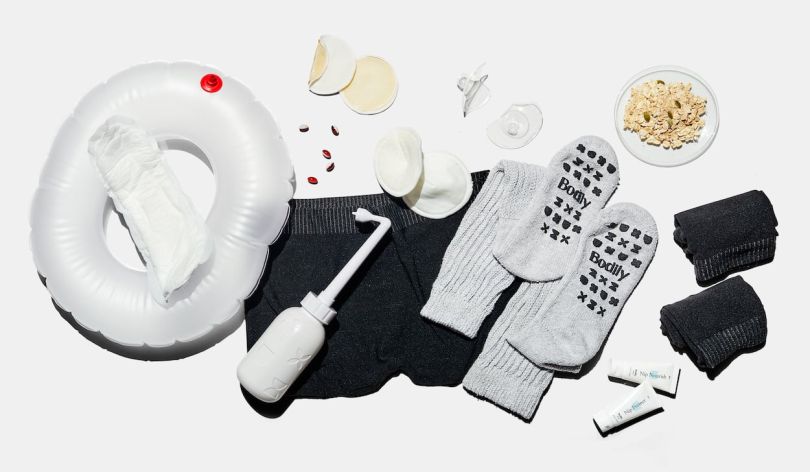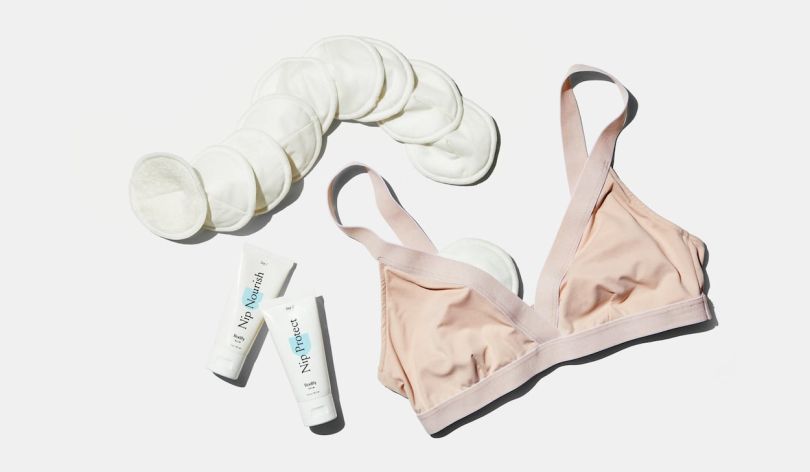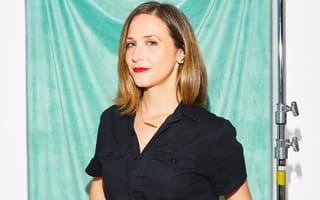
People can be a little weird about discussing female anatomy and health issues, Tovah Haim told me.
“There’s kind of, you know, a little bit of embarrassment around female physiological issues,” she said. “You think about the common experience of going to the pharmacy and, um, needing to get things that are related to female physiology. It’s sort of a little bit embarrassing to go down the aisle, and you put the things in your basket, and you kind of cover it with other things.”
I think she was talking about tampons. I wasn’t brave enough to clarify.
Our cultural squirminess about women and their bodies is nothing new. But while hiding that box of tampons under a bag of Cheetos is one thing, going into childbirth with zero information about your recovery process is quite another.
After Haim gave birth to her son, she bled so profusely she thought she was going to die. She wasn’t, but the experience made her realize how strange it was that not one of her physicians, family members or friends told her what to expect.
“I just could not believe that this is what we have to offer women in this day and age. I could not believe with something as common and universal as childbirth, which has been going on literally since the beginning of humanity, that this is what we serve women. I feel strongly that we deserve better.”
That conviction led Haim to found Bodily, a content and e-commerce platform for birth recovery and breastfeeding. Its product lines launched today, and it’s carving a space in an underserved market.

And I just said, you know what? I actually think I know how to do this.”
Did I say underserved market? I meant not-really-served-at-all market.
While there are plenty of parenting and health websites that address post-partum recovery (and so, so, so many weight loss tips), there was no one-stop solution for parents who want to read straightforward health information and buy the products they need, Haim said. She spent hours after her delivery hunting for information on message boards, and her husband couldn’t find any postpartum content targeted at fathers — like, none at all.
“I looked out and there’s literally not one website dedicated to birth recovery and pregnancy recovery and breastfeeding. And I just said, you know what? I actually think I know how to do this. I’ve been in leadership positions in e-commerce companies before, and I can’t have encountered this and just walk away and do nothing.”
She thought taboos surrounding women’s health would make it tough to get investors in the male-dominated venture capital world to commit to her concept. As it happened, many would-be investors were parents themselves, and all of them knew women who’d had babies. She overshot her funding goal, bringing in $3 million in Bodily’s seed round.
That funding helped propel the company to today’s launch. Now, new parents — and the people who support them — can click over to Bodily for articles and products aimed at breast health and breastfeeding, vaginal and Cesarean recovery and postpartum health.
While Bodily is both an e-commerce and a content platform, its content wasn’t solely formulated to sell products, Haim said. Each article is based on clinical research, and not all content comes with product recommendations. Bodily’s writers perform a literature review of each topic, sifting through research and scrutinizing methodologies, sample sizes, statistical significance of findings and bias in study funding, and they throw out studies that don’t meet their standards. Lastly, each article is reviewed by a panel of subject matter experts.
The company also worked with medical professionals on the design of Bodily-branded products, like its nursing bras.
“A lactation consultant who’s on our advisory board sat down with us and literally placed every seam to ensure it was optimized for breast health and that we’re not increasing your risk of common breastfeeding elements like clogged ducts or mastitis.” Haim said.
Other products, like extra-absorbent maxi pads, are less bespoke but essentials nonetheless. Haim said many women are completely in the dark about the fact that products like these are often needed for childbirth recovery.

This isn’t going to stop, you know?"
Postpartum health is a vast and underserved market. (If you don’t believe that, glance around you. Everyone you see was, at one point, born.)
But the implications go beyond the business opportunity. The U.S. has a huge problem with gaps in quality healthcare for pregnant people.
The United States has the highest maternal mortality rate of any high-income country, and this rate more than doubled from 1991 to 2014. What’s more, two-thirds of these deaths are preventable.
Multiple factors contribute to this frightening phenomenon — access to care and hospital practices, among them — and pregnant women’s health outcomes are sharply divided along racial lines.
This is the cultural landscape that gave rise to Bodily. But the company’s goal is to empower women, not scare them, Haim said.
“We don’t traffic in fear-mongering. We want to make sure that while we’re being very real and giving you the information so you can be prepared, we’re also giving you adequate solutions so you can actually act upon whatever concern you have.”
As a former private equity investor, Haim saw the economic rationale for this business: a large market with few real players and non-discretionary products.
As a woman who gave birth, she saw an opportunity to help new mothers feel more in control of their health.
To put it simply: We can hide those tampons in the cart, but childbirth isn’t going anywhere.
“It’s going to go on every single day for as long as humanity does, because this is how we perpetuate humanity,” Haim said. “Like, this isn’t going to stop, you know?”




